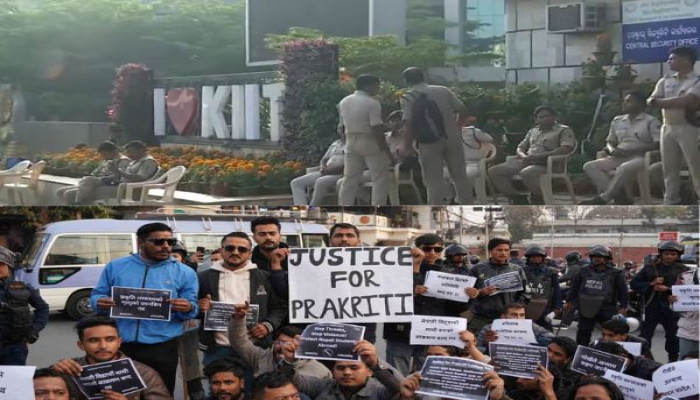KIIT Suicide row: Nepal PM intervenes, accused held
- In Reports
- 08:37 PM, Feb 18, 2025
- Myind Staff
Prakriti Lamsal, a 20-year old Nepali student studying B.Tech in Kalinga Institute of Industrial Technology (KIIT) in Bhubaneswar committed suicide on Sunday in her hostel room. It has been alleged that a 21 year old student named Advik Srivastava from Lucknow had been harassing and blackmailing her.
Lamsel’s cousin, Siddhant Sigdel filed an FIR alleging that she had been facing continuous harassment by Srivastava. The FIR also states that Lamsel had earlier reported this to the University’s International Relations Office, which only issued a warning and were unsuccessful in stopping the harassment.
On February 16, Odisha Police arrested Srivastava under Section 108 of the BNS for abetment of suicide while he was attempting to flee the scene after Lamsel’s death. He was found outside Biju Patnaik International Airport with a flight ticket from Bhubaneswar to Kolkata, dated the same day, in his name.
After Lamsal's death, the Nepali student community at KIIT staged protests, accusing the university of ignoring her complaints and failing to act. Allegations surfaced that Srivastava had blackmailed her, and a viral audio clip reportedly featured him abusing her.
Videos on social media showed clashes between students and university security. To manage the situation, the university closed indefinitely for all Nepali students on February 17 and ordered them to vacate the campus immediately.
Over 500 Nepali students protested on campus, and tensions escalated when university authorities tried to evict them. The incident has prompted responses from both the Nepalese and Indian governments.
Eyewitnesses reported that students were forcibly taken on buses and dropped at Cuttack railway station, 30 km away, without proper arrangements. Some lacked train tickets, while others had exams scheduled for February 28. Additionally, reports emerged of university officials making racially insensitive remarks during the protests, with one allegedly comparing KIIT’s student expenses to Nepal’s national budget.
The eviction of Nepali students from KIIT became a diplomatic issue, prompting concern from Nepal’s Prime Minister, KP Sharma Oli. He condemned the forced eviction on social media and called for Indian government intervention. In response, the Nepalese Embassy in New Delhi sent officials to assist the students.
Following diplomatic pressure, the Odisha government intervened, instructing KIIT to reverse its decision. The University then invited Nepali students to return and assured the resumption of normal academic activities. The Nepalese Embassy also clarified that students could choose to stay in the hostel or return home.
Authorities are continuing their investigation, examining Lamsal’s mobile phone and laptop to verify blackmail allegations. The case remains under intense scrutiny due to diplomatic pressure, student protests and claims of administrative negligence. The investigation’s findings will determine potential legal action against Srivastava and university officials.







Comments